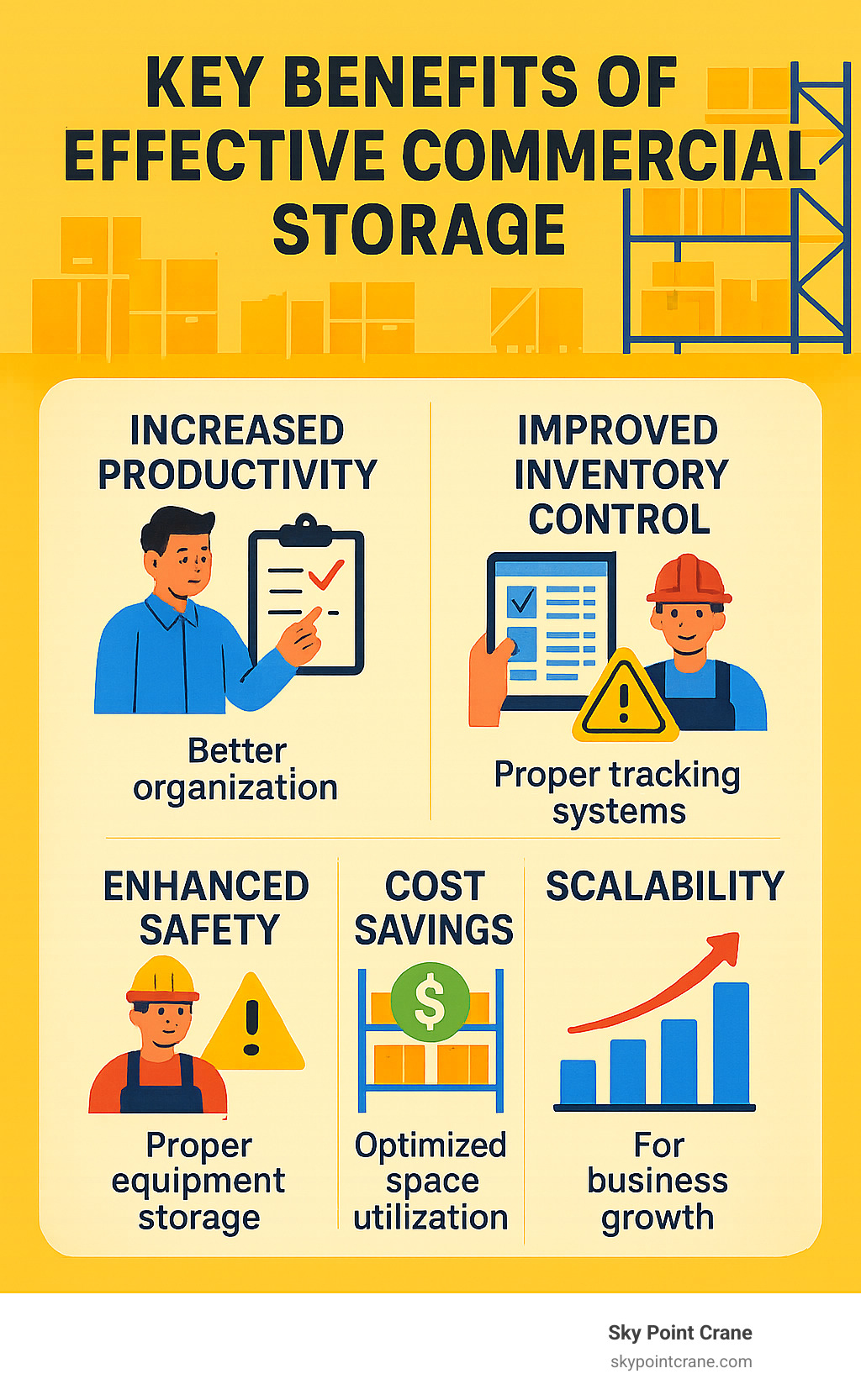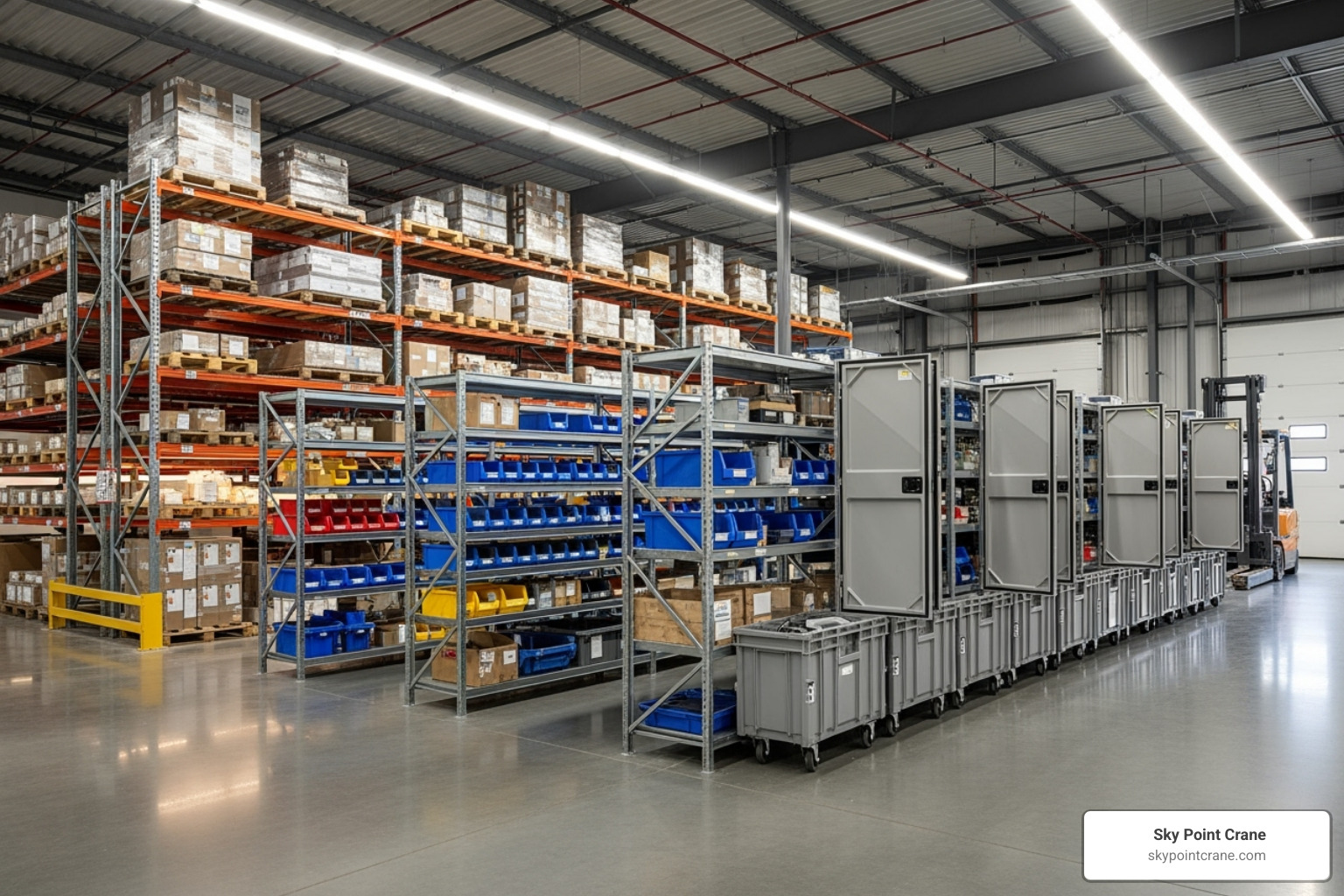Why Commercial Storage Solutions Are Essential for Modern Businesses
Commercial storage solutions are specialized systems designed to help businesses efficiently organize, secure, and manage inventory, equipment, and documents. These solutions range from warehouse pallet racking to off-site facilities, each customized for specific operational needs.
Key Types of Commercial Storage Solutions:
- Warehouse Systems: Pallet racking, cantilever racks, mezzanines, and automated storage
- Off-Site Storage: Self-storage units, climate-controlled facilities, document archiving
- Specialized Storage: Mobile shelving, high-density systems, hazardous material cabinets
- Capacity Range: From small 5×5 units to large-scale warehouse facilities
Primary Benefits:
- Optimize space and reduce operational costs
- Improve inventory management and workflow
- Improve safety through proper organization
- Provide flexible, scalable solutions
Effective storage has never been more critical. As one industry expert noted, “Every warehouse or storage facility is different, and there’s no one-size-fits-all warehouse storage solution that works for every facility.” This makes choosing the right approach crucial for success.
For construction and industrial businesses, storing heavy machinery and oversized equipment requires strategic placement. With warehouse racking costs ranging from $75 to $450 per pallet position, informed decisions are essential for maximizing ROI.
I’m Dave Brocious. With over 30 years of experience in manufacturing and distribution, I’ve helped companies optimize their commercial storage solutions for greater efficiency. At Sky Point Crane, I’ve seen how the right storage strategy transforms business operations.

Simple commercial storage solutions glossary:
- business storage for rent
- commercial storage buildings for rent
- commercial storage facilities for sale
Exploring the Spectrum of Commercial Storage Solutions
When it comes to commercial storage solutions, there is no one-size-fits-all approach. Each business has unique needs, and the right solution depends on your specific inventory and operational requirements. Let’s explore the main categories of storage to help you make the best choice.

Warehouse and Industrial Storage Systems
For businesses with significant inventory or large equipment, industrial storage systems are the backbone of efficient operations. These engineered solutions are designed to maximize every cubic foot of your space.
- Pallet Racking Systems: These are the workhorses of most warehouses, allowing for vertical storage. Selective racking offers 100% access to every pallet, while double-deep racking increases density. For high-volume, similar items, drive-in/drive-thru racking allows forklifts to enter the bay.
- LIFO and FIFO Systems: Push-back racking uses a Last-In, First-Out (LIFO) system ideal for non-perishable bulk goods. In contrast, pallet flow racking uses gravity for a First-In, First-Out (FIFO) system, perfect for rotating perishable items.
- Cantilever Racks: These are essential for storing long, bulky items like lumber, pipes, or furniture that don’t fit on standard racks.
- Mezzanines: These act like an extra floor, creating more usable space for offices, assembly areas, or additional storage without new construction.
- Automated Storage and Retrieval Systems (AS/RS): These robotic systems automatically store and retrieve items, boosting productivity and accuracy while improving safety.
- Vertical Storage: Solutions like shelving units and wire containers help maximize ceiling height and organize smaller or oddly shaped goods.
For comprehensive solutions customized to your specific needs, explore our Industrial Storage options.
Off-Site and Self-Storage Facilities
When your primary location isn’t large enough, off-site and self-storage facilities offer flexibility without long-term commitments. Common uses include document archiving, storing excess inventory for seasonal demand, and housing equipment used infrequently.
- Unit Sizes: A 5×5 unit is great for office files, while a 10×10 unit can hold overstock and equipment.
- Climate-Controlled Units: These maintain stable temperatures to protect sensitive items like electronics, documents, or medical supplies from damage.
- Drive-Up Access: This feature simplifies loading and unloading by allowing you to drive directly to your unit’s door.
- Month-to-Month Leases: This flexibility allows you to scale your storage space up or down as your business needs change.
If you’re looking for flexible storage options for your business, check out our Business Storage for Rent services.
Specialized and High-Density Storage
Some items require highly specialized commercial storage solutions due to their value, nature, or safety requirements.
- Mobile Shelving: These high-density systems eliminate fixed aisles and can double your storage capacity in the same footprint, making them ideal for archives or medical records.
- Specialized Cabinets: Flammable or hazardous materials require cabinets that meet strict safety regulations. Fine art, antiques, and pharmaceuticals need secure, climate-controlled environments.
- Lithium-Ion Battery Cabinets: These are a critical safety investment. Engineered to contain thermal runaway events, they feature fire liners, fume filters, and extinguishing systems.
- Digital Data Cold Storage: Physical, offline storage for hard drives protects critical data from hacks and network failures. Specialized cases ensure digital files are safe and accessible offline.
For secure digital storage solutions, learn more about Hard Drive Storage | ProStorage | Digital Cold Storage.
How to Select the Right Commercial Storage Solution for Your Business
Choosing the right commercial storage solutions requires a clear understanding of your business’s unique requirements, workflows, and growth plans. Whether you’re managing paperwork, seasonal inventory, or heavy machinery, each situation calls for a different approach.

Assessing Your Core Needs: Inventory, Space, and Workflow
Before choosing a storage system, take a hard look at what you’re storing and how you’re using it.
- Understand Your Inventory: The type, dimensions, and weight of your items determine your storage needs. Knowing this information is critical for safety, as overloading systems can lead to accidents.
- Analyze Turnover Rate: Fast-moving items need to be easily accessible, while slow-moving inventory can be stored more densely.
- Calculate Space: Don’t just think about floor space. Vertical space is valuable real estate. Pallet racking, mezzanines, and automated systems can dramatically increase capacity without expanding your footprint.
- Optimize Workflow: A smart storage layout can reduce travel time for staff during picking and packing, cutting labor costs and boosting productivity. Ensure your storage system works seamlessly with your material handling equipment like forklifts and pallet jacks.
Key Factors for Choosing Your commercial storage solutions
Once you understand your core needs, consider these factors:
- Accessibility: Do you need 24/7 access or are business hours sufficient? Frequently accessed items may require drive-up units or selective racking, while denser storage works for less-used materials.
- Security: Protect your assets with features like 24/7 surveillance cameras, gated entry, access control systems, and on-site staff.
- Scalability: Your storage solution should adapt as your business grows. Month-to-month leases and modular racking systems offer flexibility.
- Location: Proximity to your main operations saves time and transportation costs. For our clients in Western and Central Pennsylvania, Ohio, West Virginia, and Maryland, a convenient location is key.
Sizing and Capacity: From Small Units to Large-Scale Commercial Storage Facilities
Getting the size right is crucial. While online storage calculators can provide a rough estimate, professional guidance is invaluable for larger needs.
A 5×5 unit is suitable for documents, while a 10×10 unit can handle files and overstock. However, heavy machinery and oversized equipment present unique challenges that standard units cannot handle. This is where our expertise at Sky Point Crane becomes essential. We specialize in solutions for industrial assets that require precision handling and safety expertise.
Our Indoor Industrial Storage protects valuable equipment from the elements, while our Outdoor Industrial Storage is ideal for weather-resistant items. For businesses with these specialized needs, explore our Commercial Storage Facilities to see how we can provide a comprehensive solution.
Maximizing ROI: Cost, Efficiency, and Safety
Investing in commercial storage solutions is a strategic decision that should deliver a strong return. The key is to balance upfront costs with long-term benefits in efficiency and safety.

Understanding the Costs and Potential Savings
Commercial storage solutions offer predictable costs and measurable returns. The initial investment for warehouse racking can range from $75 to $450 per pallet position, depending on the system type, material, and capacity. While specialized solutions like climate-controlled units or automated systems cost more upfront, they often lead to greater long-term savings.
The long-term ROI comes from several areas:
- Reduced Waste: Less time is spent searching for items, and there is less damage to inventory.
- Optimized Space: Better use of vertical space can delay or prevent costly facility expansions.
- Improved Productivity: Smoother workflows reduce labor costs and increase throughput.
- Flexibility: Month-to-month leases for self-storage prevent you from being locked into expensive, long-term commitments.
Boosting Operational Efficiency with the right commercial storage solutions
Efficiency is about creating a seamless system. Smart storage placement streamlines logistics and eliminates bottlenecks. Proper organization and clear labeling improve order picking accuracy, reducing costly errors and returns. Good ergonomics in system design reduce employee fatigue and potential injuries, while maximizing warehouse capacity with vertical and dense storage solutions allows you to store more in the same footprint. The result is reduced clutter and an improved workflow.
Prioritizing Safety in Industrial Storage Systems
Safety is non-negotiable and protects both your people and your profits.
- Pallet Rack Safety: Anchor bolts are critical for securing racks to the floor, preventing collapse from impacts. Load capacity limits must never be exceeded, as overloading is a leading cause of system failure.
- Regular Inspections: The Occupational Health and Safety Act (OHSA) requires regular inspections to identify damage and ensure structures can support their intended loads.
- Fire Safety: Proper flue space (clearance between stored items) is crucial for sprinkler system effectiveness. For volatile items like lithium-ion batteries, specialized cabinets are essential for fire containment. These cabinets, some validated by tests like the UL Propagation Test, are engineered to prevent catastrophic damage.
Partnering with a Full-Service Provider
When it comes to commercial storage solutions, having the right partner can make the difference between success and frustration. A full-service provider acts as a strategic partner, guiding you through every step from initial design to long-term maintenance.
From Blueprint to Build: Design and Installation Services
A successful storage project begins with smart design. A comprehensive provider will analyze your workflow, operations, and growth plans to create a custom solution.
- Custom Design and Space Planning: Experts use their experience to create systems customized for your business, considering factors like inventory turnover and accessibility. They are masters at utilizing vertical space to find capacity you didn’t know you had.
- Professional Installation: Precision during installation is critical for safety and longevity. This includes ensuring pallet racking is correctly anchored and all components meet engineering specifications.
- Building Code Compliance: A reputable provider ensures your new system meets all local building codes and safety regulations, handling the necessary paperwork and approvals.
- System Deployment: The best providers coordinate a seamless deployment process that minimizes disruption to your daily operations.
Ongoing Support: Maintenance, Inspection, and Reconfiguration
Proper commercial storage solutions require ongoing attention to remain safe and efficient.
- System Maintenance and Inspections: Regular maintenance prevents small issues from becoming costly problems. A full-service provider also conducts required rack inspections (per OHSA regulations) to identify damage and keep you compliant.
- Damage Assessment and Repair: When accidents happen, experts can assess the damage and recommend the right course of action for repairs or replacements.
- Reconfiguration and Modification: As your business evolves, your provider can help with dismantling, removal, and system modifications. They can expand or reconfigure your systems to adapt to new workflows or inventory requirements.
For businesses with heavy industrial equipment, specialized rigging and transport are essential. At Sky Point Crane, we understand that moving massive machinery into storage requires expertise that goes beyond standard solutions. Our comprehensive approach ensures your valuable assets are handled with the precision and safety they deserve.
Frequently Asked Questions about Commercial Storage
Here are answers to common questions business owners have when evaluating commercial storage solutions.
How much does warehouse racking typically cost?
The cost of warehouse racking varies, but a general estimate is between $75 to $450 per pallet position. The final price is influenced by factors like the type of steel used, the required load capacity, system density, and any automation features. While automation increases initial costs, it often pays for itself through improved efficiency.
Are regular inspections required for pallet racking?
Yes, regular inspections are crucial and often required by regulations like the Occupational Health and Safety Act (OHSA). These inspections are not just about compliance; they are essential for identifying visible damage, ensuring structural integrity, and preventing dangerous and costly system failures. Regular checks help maintain a safe working environment.
What is the difference between LIFO and FIFO storage systems?
These acronyms define how inventory is accessed and can significantly impact your operations.
- LIFO stands for “Last-In, First-Out.” The most recently stored items are the first to be retrieved. This system, often using push-back racking, is great for non-perishable goods where inventory age is not a concern.
- FIFO means “First-In, First-Out.” The first items stored are the first to be retrieved. This is ideal for perishable goods or items with expiration dates, ensuring proper inventory rotation. Pallet flow racking is a common FIFO system.
Choosing between LIFO and FIFO depends entirely on your inventory type and business needs.
Conclusion
Finding the right commercial storage solutions is about opening up your business’s true potential. By optimizing how you store, organize, and access your assets, you can improve efficiency, achieve significant cost savings, and create a safer workplace.
There is no one-size-fits-all answer. Success comes from strategic planning that considers your unique needs, workflow, and growth. Thriving businesses view storage as a critical component of their operational strategy, with safety as the top priority. Adhering to safety standards and regulations like OHSA protects your most valuable asset: your people.
For businesses with heavy industrial equipment, the challenges extend beyond finding space. Moving massive assets requires specialized rigging and transport. That’s where companies like Sky Point Crane provide essential expertise. We understand the precision and equipment needed to handle valuable industrial assets safely and efficiently.
The investment in proper commercial storage solutions pays dividends in productivity, inventory control, and space utilization. When your storage works seamlessly, your entire business runs more smoothly.
Whether you’re in Western and Central Pennsylvania, Ohio, West Virginia, or Maryland, the right partner can help you steer these complex decisions. Explore our comprehensive Industrial Storage solutions to see how we can support your operational needs. We’re not just lifting things; we’re lifting your business to new heights.
